|
|
|
Sort Order |
|
|
|
Items / Page
|
|
|
|
|
|
|
| Srl | Item |
| 1 |
ID:
151298
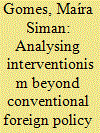

|
|
|
|
|
| Summary/Abstract |
Most of the analysis dealing with so-called “emerging powers” in the field of peace and security seek to explain the intentions and motivations (supposedly) behind these states’ foreign policy and changing normative positions. Several of those studies see foreign policy decisions as the result of rational processes, defined by a “means-and-ends” logic, essentially oriented by preconceived national interests, clear ideational precepts and fixed identities. Through a non-conventional analysis of the participation of Brazil in the United Nations Stabilization Mission in Haiti (MINUSTAH), the paper aims to advance an understanding of foreign policy as an identity practice that, especially in moments of domestic identity crisis, helps reinforce and stabilize specific representations of the state self and of those acting in its name. Informed by a post-positivist approach, the case discussed in the paper opens some avenues to explore how interventionism can be analysed beyond traditional foreign policy rationales and mainstream international relations theories.
|
|
|
|
|
|
|
|
|
|
|
|
|
|
|
|
| 2 |
ID:
151311


|
|
|
|
|
| Summary/Abstract |
The emergence of targeted sanctions in the mid-1990s was due to the humanitarian impact of embargoes, which were deemed unacceptable and compelled senders to shift to measures designed to affect only wrongdoers. Twenty years on, the present paper considers the extent to which autonomous sanctions are designed to affect those individuals and elites responsible for the behaviour the EU aims to condemn. How faithful has the EU remained to this concept in its sanctions policy? The enquiry scrutinizes diverse practices in three established sanctions strands of the EU, development aid suspensions, Common Foreign and Security Policy (CFSP) sanctions and Generalised Scheme of Preferences (GSP) withdrawals. It shows that it has been more faithfully implemented in some strands of EU sanctions than in others. Specifically in the flagship CFSP sanctions practice, the due process motivated court challenges of its blacklists have led the EU to modify selection criteria in a way that renders them potentially less targeted.
|
|
|
|
|
|
|
|
|
|
|
|
|
|
|
|
| 3 |
ID:
151313
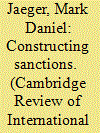

|
|
|
|
|
| Summary/Abstract |
Targeted’ sanctions seek to circumvent a target state’s citizens in general from the adverse economic impact of coercion. Arguably, this would remedy some of the population’s incentives to engage in the well-known “rallying-around-the-flag”. Yet occasionally, targeted sanctions still seem to produce such an effect. This paper explores sanctions conflicts as social constructs. It purports that rally-around-the-flag is all but one part of the discursive dimension of sanctions conflicts. Sanctions are intricately connected with the conflict setting they occur in. The study suggests a dialectical relation between how opponents perceive conflicts and the meaning of sanctions therein. This nexus of different constructions of sanctions moreover extends to “targeted” sanctions as well: As restrictive measures against Zimbabwe demonstrate, they are not the kind of minimally-invasive operations with clinical precision as such reasoning would suggest. Whether sanctions are really “targeted”, sparing the economy and concentrating on the culprits, is as much a question of discourse in the target state.
|
|
|
|
|
|
|
|
|
|
|
|
|
|
|
|
| 4 |
ID:
151312
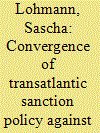

|
|
|
|
|
| Summary/Abstract |
Between 1996 and 2012, cooperation between the United States (US) and the European Union (EU) on Iran sanctions underwent a dramatic shift from open disagreement to almost unanimous consensus. Whereas the US preferred negative sanctions throughout this period, the EU opted at first for using economic incentives and dialogue. The EU’s diverging approach exemplified the overall preference for multilateralism and engagement strategies over unilateral coercive measures. Beginning in 2005, however, European sanction policy towards Iran converged with that of the US. In this article, I argue that the convergence of transatlantic sanction policy against Iran cannot be understood without the pressure employed by Washington. The US pressure campaign consisted of secondary sanctions against European companies. As necessary condition, US pressure has been a key external factor that complemented the EU’s internal developments fostering a more coercive approach towards Tehran after the revelation of the Iranian nuclear programme in 2002 and the breakdown of the E3 (Great Britain, France and Germany) negotiations in 2005.
|
|
|
|
|
|
|
|
|
|
|
|
|
|
|
|
| 5 |
ID:
151315
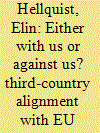

|
|
|
|
|
| Summary/Abstract |
Since the mid-1990s, selected neighbours have in impressive numbers aligned with European Union (EU) foreign policy sanctions. However, much more than for any other sanctions case, neighbours have declined joining recent measures against Russia/Ukraine. This article uses freshly gathered data from the entire period of the Common Foreign and Security Policy (CFSP) to analyse how the practice of alignment influences international relations in Europe. Thereby, the article demonstrates that: (1) sanctions are not a two-party game, but an instrument that impacts broadly on relations with third countries; (2) alignment with sanctions not only articulates similarity, but contributes to normative polarization in wider Europe; (3) for a high-salience case such as Russia sanctions, neighbours are reluctant to be instrumentalized for EU foreign policy purposes.
|
|
|
|
|
|
|
|
|
|
|
|
|
|
|
|
| 6 |
ID:
151299
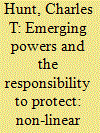

|
|
|
|
|
| Summary/Abstract |
The perceived clash of norms associated with the emergence of rising powers is nowhere more pronounced than in relation to the responsibility to protect (RtoP). However, attempts to explain rising powers’ engagement with norms such as the RtoP are often limited and limiting in what they can tell us. Orthodox models portray predominantly linear and diffusionist logics of norm evolution that underplay the complex interaction implicit in unpredictable outcomes at the systemic level. This article identifies a range of factors that drive participation (or generate hesitation) amongst emerging powers in the development and application of the RtoP. It proceeds to illustrate how changes in normative behaviour emanate from top-down and bottom-up processes as well as the feedback between them. It argues that norm evolution is consequently a unique and emergent outcome of complex international society and therefore argues for using complexity thinking as a heuristic to augment current models and explanations of the evolution of norms in the international system.
|
|
|
|
|
|
|
|
|
|
|
|
|
|
|
|
| 7 |
ID:
151314


|
|
|
|
|
| Summary/Abstract |
Contrary to other European Union (EU) restrictive measures, arms embargoes have preserved higher levels of member state sovereignty. They not only require members’ consensus to be imposed, but their implementation also is in the hands of member states. How has this affected the operation of EU arms embargoes? On the one hand, and according to the international institutions literature, both consensus and national implementation requirements can undermine the success of multilateral policies. On the other hand, the growth of EU arms export norms suggests that embargoes have become easier to impose and implement. But the relationship among EU arms export norms, institutional design and embargo operation remains under-examined in the literature. Drawing on case studies of the Russia and Uzbekistan embargoes—and on interviews with policymakers and experts—this article analyses this relationship. I argue that growing EU arms export norms have alleviated some, but not all, of the concerns associated with institutional design. Whether or not EU members cooperate on arms embargoes still seems to be determined by national-level considerations, rather than by joint foreign and security policy goals.
|
|
|
|
|
|
|
|
|
|
|
|
|
|
|
|
| 8 |
ID:
151305
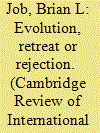

|
|
|
|
|
| Summary/Abstract |
This paper outlines the development and evolution of the normative positions of China, Brazil and India on issues surrounding the responsibility to protect (R2P) by charting their engagement in the ‘institutionalized conversation’ within the United Nations. In doing so, it seeks to dispel characterizations of these states as having adopted individual or common positions that either wholly reject or accept R2P. The nuances of the adaption and adoption of their postures need to be appreciated. Indeed, of the three component ‘pillars’ of R2P, they find themselves in general accord regarding Pillar One (state responsibility) and Pillar Two (prevention and assistance). It is on Pillar Three (reaction and response) that they diverge from each other and find themselves most at variance with ‘Western’ agendas of intervention and regime change. This divergence is most sharply drawn at present, in light of the Libyan and ongoing Syrian experiences.
|
|
|
|
|
|
|
|
|
|
|
|
|
|
|
|
| 9 |
ID:
151294
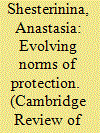

|
|
|
|
|
| Summary/Abstract |
This article examines the influence of civilian protection norms on China’s response to the 2011 crisis in Libya. It argues that Responsibility to Protect—an emerging norm commonly associated with the Libyan case—did not play a major role in China’s abstention on Resolution 1973 (2011) authorizing international intervention in Libya. For China, Responsibility to Protect is merely a concept and could not serve as the basis for intervention. Instead, Protection of Civilians in Armed Conflict, as a normative foundation for civilian protection endorsed by China, offers a more appropriate lens for understanding China’s vote. Protection of Civilians, however, does not accommodate China’s unprecedented evacuation of Chinese nationals from Libya. This operation proceeded from a third logic of Protection of Nationals Abroad, which poses dilemmas for China’s strict adherence to the principles of sovereignty and non-interference and brings to bear domestic interests and notions of protection.
|
|
|
|
|
|
|
|
|
|
|
|
|
|
|
|
| 10 |
ID:
151320


|
|
|
|
|
| Summary/Abstract |
China has witnessed a continual drop in the labour income share of its gross domestic product (GDP) and a steep rise in income that has caused a savings glut and high investments. China’s shrinking domestic demand indicates that its output growth must increasingly rely on expanded manufacturing exports to the US. China’s state accommodation for US offshoring further aggravates trade imbalances between the two countries. The United States is also experiencing a rise in social inequality associated with a decline in savings that is a fundamental cause of its current-account deficit with China. The swelling US service sector interacts with a high ratio of consumption to income, and the liberal US policy for cost outsourcing to China has a complicated impact on employment and an adverse effect on inequality.
|
|
|
|
|
|
|
|
|
|
|
|
|
|
|
|
| 11 |
ID:
151296


|
|
|
|
|
| Summary/Abstract |
How do rising powers choose to allocate their finite resources among the multiple global and regional security organizations? Building on the literatures on forum shopping and rising powers, we argue that the different organizational investment choices of rising powers are explained by varying regional ideational affinities. Organizational settings have ideational foundations that can look very different from region to region. We argue that regional ideational affinity leads rising powers to invest in regional rather than global organizations. However, if the ideational composition of the region is highly diverse, global organizations are a better vehicle to accommodate rising powers’ emergent ambitions. To demonstrate our argument, we examine the choices of Brazil and South Africa in terms of their material and ideational investments in regional and global organizations.
|
|
|
|
|
|
|
|
|
|
|
|
|
|
|
|
| 12 |
ID:
151317


|
|
|
|
|
| Summary/Abstract |
Asymmetric relationships have been fundamental to the study of international relations, becoming even more important with the end of the Cold War, which left the United States as the sole global superpower. However, what impact does the distance between two countries have on the magnitude of an asymmetric relationship and the exposure of the countries to one another? This article examines these phenomena by analysing the relationship between Havana and Moscow from the time of the Russian Revolution in November 1917 to the present. Specifically it examines three distinct periods: from November 1917 until February 1960, from February 1960 until the implosion of the Soviet Union in late 1991 and from 1992 to the present. This article posits that the distance between two countries reduces neither the intensity of an asymmetric relationship nor the exposure of the two countries to one another.
|
|
|
|
|
|
|
|
|
|
|
|
|
|
|
|
| 13 |
ID:
151321
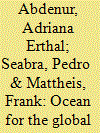

|
|
|
|
|
| Summary/Abstract |
In this article, we analyse an instance of revitalisation of a dormant interregional organisation dating back to the Cold War: the Zone of Peace and Cooperation of the South Atlantic (ZOPACAS), initially launched by South American and African states in 1986 through the UN General Assembly. Drawing on the concepts of “consensual hegemony” we argue that the current phase of ZOPACAS’ existence is characterised by Brazil's efforts to rekindle it, thus reflecting its aspiration to create a new space of influence. Rather than pursuing more traditional forms of regional leadership, Brazil uses ZOPACAS as part of a persuasion-based strategy based on regional multilateralism that is designed in antagonism to other international organisations and Western powers. However, this strategy also faces important limitations resulting from resource constraints, lack of institutionalisation and an excessive exclusionary focus on minimising the role of global powers with interests in the region.
|
|
|
|
|
|
|
|
|
|
|
|
|
|
|
|
| 14 |
ID:
151293


|
|
|
|
|
| Summary/Abstract |
The papers in this special section are the results of two workshops that were held in 2014, both organized by the editors of this special section. The first workshop was financed by a Venture Research Grant from the International Studies Association and held at that organization’s Annual Convention in Toronto in March 2014. The second was held in Rio de Janeiro in September of that year, under the auspices of the Institute of International Relations of the Pontifical Catholic University of Rio de Janeiro (IRI/PUC-Rio). Both workshops were concerned with mapping out in both conceptual and empirical terms how a new generation of emerging powers were attempting to reshape the international order. Much has changed over the last two years since those workshops took place. While there were storm clouds on the horizon even back then, at the time of writing virtually all the emerging powers find themselves mired in significant difficulties that will weigh down and perhaps in some cases even snap their upwards ascent.
|
|
|
|
|
|
|
|
|
|
|
|
|
|
|
|
| 15 |
ID:
151316


|
|
|
|
|
| Summary/Abstract |
From 1991 until 2012, the European Union (EU) applied sanctions on Myanmar with the purpose of promoting democracy and human rights. In addition, the EU called on the Association of Southeast Asian Nations (ASEAN) to exert pressure on Myanmar. This paper analyses, in the context of Myanmar’s 1997 accession to ASEAN, how the EU’s sanctions approach towards Myanmar was perceived within ASEAN and related repercussions of this approach on ASEAN–EU interregional relations. With the accession of Myanmar as the base story, it is argued that a regional organizations membership concept implies specific dealings with normative ideas such as democracy and human rights as well as strategies of punishment such as sanctions. The differing membership concepts of ASEAN and the EU explain ASEAN’s critical perception of the EU’s sanctions on Myanmar. Further, the conceptual difference in membership also explains that the EU’s pressure on ASEAN has severely impaired the interregional relations.
|
|
|
|
|
|
|
|
|
|
|
|
|
|
|
|
| 16 |
ID:
151319
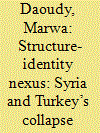

|
|
|
|
|
| Summary/Abstract |
The relation between Syria and Turkey transformed from enmity in the 1990s to détente in the early 2000s, grew into amity after the rise to power of the Turkish Justice and Development Party (AKP, Adalet ve Kalkinma Partisi) in 2002, and reverted to enmity in the aftermath of the Arab Spring. This research suggests that a combination of structural and identity-based factors, at regional and domestic levels, induced the collapse of the decade-long amity. This paper builds on the notion of a “structure-identity nexus”; and determines the orientation of foreign policy outcomes from the 1990s until 2011. The discussion outlines the merits of a hybrid theoretical perspective by elaborating on Barkin’s idea of ‘realist constructivism’, which draws on two rival traditions, realism and constructivism. The structure-identity framework explains the double transformation in the relationship, considering the return to inter- and intra-state conflict in 2011. The research draws on extensive primary and secondary sources, as well as interviews carried out with key figures. In addition to the relationship between Syria and Turkey, the structure-identity nexus provides potential broader explanations that fuel the shift from amity to enmity in the complex network of states found in the Middle East.
|
|
|
|
|
|
|
|
|
|
|
|
|
|
|
|
| 17 |
ID:
151323
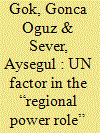

|
|
|
|
|
| Summary/Abstract |
This article aims to explore the relationship between regional powers and the United Nations (UN) with respect to regional issues by examining UN-Turkish ties concerning the Middle East during the 2000s. Bidding for a leading regional role in the Middle East, especially in the 2000s, the Justice and Development Party (AKP) government in Turkey has increasingly used international platforms, including the UN, to gain a significant regional position in the Middle East. Turkey’s relationship with the UN in this respect could provide a relevant example to explore multilateralism and multilateral instruments in Turkey’s perceived regional power role during the last decade. The term “regional power” will be used as a conceptual framework to explore Turkey’s behavioural pattern with respect to the UN in view of the regional-global linkage, as global activism is nearly a standard behaviour of any state with a leading regional power role/claim. In view of this, the period during which Turkey held a temporary seat on the UN Security Council between 2009 and 2010 will be given particular attention in order to identify any significant link or at least any tentative correlations between Turkey’s then-closer involvement in the UN and its regional power role/claim in the Middle East. Moreover, fluctuations recorded in Turkey’s relations with the UN with respect to the Middle East during the last decade will be taken into account to examine a variety of challenges involved in any regional state’s relations with the UN regarding regional issues. Conducting a periodical analysis of Turkey-UN relations with respect to the Middle East could provide some provisional answers regarding both limitations and opportunities related to the future state of relations between any regional power and the most universal organization of world politics.
|
|
|
|
|
|
|
|
|
|
|
|
|
|
|
|
| 18 |
ID:
151318


|
|
|
|
|
| Summary/Abstract |
One of the more interesting and potentially powerful developments within Marxist approaches to the field of international relations has been the recent revival of Trotsky’s concept of uneven and combined development (UCD). However, it appears that there have been very few attempts within this literature to specify in concrete terms what is meant by mechanisms of ‘combination’. Failing this, UCD runs the risk of falling into triviality. To this end, this article suggests that migration has historically functioned as a crucial element of combined development, contributing to the uneven incorporation of non-capitalist societies into the remit of a developing world capitalist market. As illustration, I take settler-colonial development and the Great Atlantic Migrations as my focal point, drawing out a comparative study of Argentine and Canadian wheat production in the late nineteenth century. In positing these migrations as mechanisms of combined development I suggest that such were the means by which both European capitalism developed extensively and intensively and New World societies were subjected to the ‘pressures of backwardness’, compelled to transform their own social relations of production.
|
|
|
|
|
|
|
|
|
|
|
|
|
|
|
|
| 19 |
ID:
151322
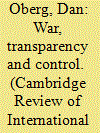

|
|
|
|
|
| Summary/Abstract |
In contemporary research, transparency is commonly understood to indicate and guarantee openness, in ways that make it synonymous with positive characteristics of governing. However, the allegedly benevolent link between transparency and governing has also been questioned, giving rise to arguments that transparency enables violent social control. Drawing upon this latter view, the article stages an encounter between critical debates on transparency and critical accounts of war to examine the way that they come together in the operationalization of warfare. Engaging particularly with Jean Baudrillard’s writing on transparency, the article inquires into the way control is socially manufactured and administered through military doctrines. It concludes that the operationalization of warfare is not, as many tend to argue, first and foremost about a response to practical problems when conducting wars. Rather, it consists of the potential to unveil global space and global time as an attempt to maintain and control future political becoming.
|
|
|
|
|
|
|
|
|
|
|
|
|
|
|
|
|
|
|
|
|